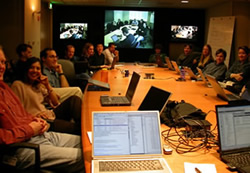| |
Tools and Influence Adina picks up a conversational thread from the Emergent Democracy Happening on the use of tools that could help political action emerge from decentralized online communities. I actually think the scope is political influence, not action. Activism is one form of influence.
Her key points:
- Tools that make it easy to form self-organizing groups.
- Tools that make it easy to increase the intensity of interaction.
- Tools that help communicate with governments.
- Tools that amplify memes.
One thing that's unique about blogs and other emerging tools is the density of feedback loops between participants. These tools not only amplify memes but, as Joi would say, creates a competition of ideas -- leveraging nested feedback loops with varying degrees of intensity. The dethroning of Trent Lott was a case of a meme that had a fitness level that led to discovery, won in competition to be amplified as well as sustained. Compared to the mass media, this pattern of emergence outpeforms in discovery and sustainability (beyond the news cycle) -- that impacted the mass media to influence both individual and institutional pluralistic mechanisms for change.
Discovery and honing the fitness of the meme takes place in creative networks. A phase transition occurs from the creative to social to political networks within a competition of ideas for amplification. Social networks sustain meritous memes within the social and political levels. More on this meme later today.
9:27:33 AM 
|
|
Social Software in Meetings Kevin Lynch: "There's still a lot to learn about how technology can assist meetings, particularly distributed meetings." [Werblog]
Interesting insight from practiced use of multi-modal communication tools in meetings...
|

...The meeting rooms were designed to help distributed teams collaborate, and it mostly works, but still a lot to learn about remote meetings. The video systems in the far wall can show multiple locations, and the screens can also be used to project computer displays from computers plugged into ports on the table. Both sides of a meeting can control camera panning and zooming. The audio is handled by microphones embedded in the table and speakers in the ceilings. It's all IP-based and works over a high speed internet connection between our offices.
Almost everyone carries their laptop computers into meetings now—the wireless network has driven this over the past couple years. During meetings, people are present in two places at once, partly in the live meeting and partly in the virtual space of their computer. Conversations in meetings frequently happen on multiple levels in this environment, with people not only talking but also sending email and instant messaging each other, as well as sending documents and links to view during discussion. If you don't have your computer, you really miss out on parts of the meeting... |
8:59:47 AM 
|
|
Participants, not Consumers Reclassifying the 'Consumer'. My friend Jerry Michalski, a notable thinker about how digital technology is changing the world, has long loathed the word "consumer" -- calling it grossly inaccurate and demeaning description of human beings in a market economy. I agree entirely.[Dan Gillmor's eJournal]
In a more connected economy, when I buy a product or service I become a participant in its network. I engage in conversations with the company that provides it. I am a positive or negative reference for the product to other potential buys. I become part of the informal network that supports it, particularly with complicated tech products. I self-bundle two complementary products and thereby bridge two networks. Participants play active roles -- not just in the consumption of a good, but the production of information that relates to it.
The more "out there" sugggestion is that this production follows Yochai Benkler's commons-based peer production model.
8:21:27 AM 
|
|
|

